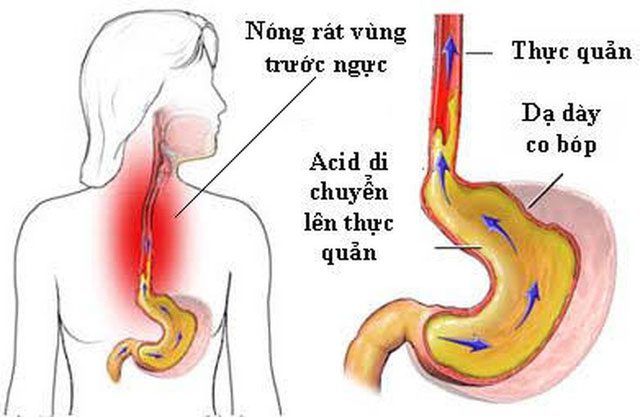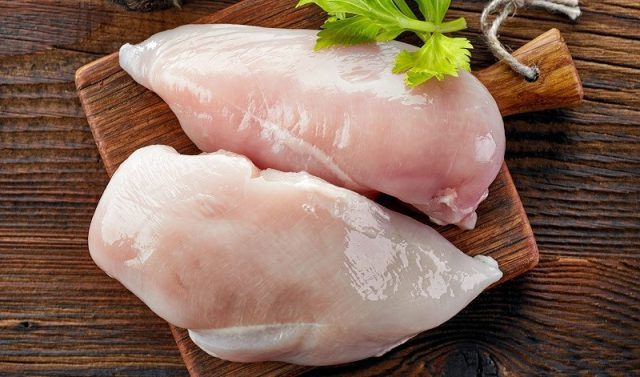The diet plays a crucial role in managing the symptoms of acid reflux and is often the first recommendation for those suffering from gastroesophageal reflux disease (GERD). Sometimes, implementing simple changes can significantly alleviate the discomfort associated with this condition.
1. What Should Individuals with Gastroesophageal Reflux Disease Do and Avoid When Eating?
In reality, there are certain foods that can help reduce the symptoms of GERD, while others may exacerbate the condition.
Therefore, patients are often advised on what to eat or limit, avoid, or substitute with more beneficial foods. Additionally, eating habits significantly influence the state of gastroesophageal reflux.
According to Dr. Nguyen Xuan Tuan, a lecturer at Hanoi National University of Medicine and Pharmacy, gastroesophageal reflux disease (also known as reflux esophagitis) is a pathological condition caused by the backflow of acidic fluid from the stomach into the esophagus, resulting in symptoms such as heartburn, regurgitation, sore throat, and prolonged laryngitis.
Long-term disease can lead to serious consequences such as esophagitis, esophageal stricture, and even esophageal cancer.

Image of gastroesophageal reflux.
In treating gastroesophageal reflux disease, besides medication, dietary and lifestyle choices play a particularly important role.
Patients should note the following recommendations:
- Divide meals into smaller portions throughout the day; avoid overeating at any single meal.
- Eat slowly and chew thoroughly; spend 20-30 minutes on each meal.
- Prepare food by steaming or boiling; limit frying and sautéing, and reduce the use of strong spices.
- Incorporate high-fiber, easily digestible foods such as leafy greens, fruits, fish, eggs, skinless poultry, and seafood.
- Maintain a healthy diet to effectively manage weight, avoiding overweight and obesity.
Limit or avoid the following eating habits:
- Limit intake of overly liquid foods; do not drink large amounts of water at once; keep servings to less than 200ml each time.
- Limit citrus fruits such as lemons, grapefruits, and oranges, which are acidic.
- Avoid high-fat foods, fried foods, processed items, and refined carbohydrates.
- Steer clear of foods that can irritate the stomach and esophagus, such as coffee, tea, and strong spices like pepper, chili, and mustard.
- Avoid eating habits that produce excessive gas in the stomach, such as rushing meals, using straws for drinks, chewing gum, or consuming carbonated beverages.
- Completely avoid carbonated drinks and bottled sodas.
- Steer clear of positions that can provoke reflux, such as bending forward, lying flat after meals, or wearing overly tight clothing.
- Avoid strenuous exercise, sports, or running immediately after eating. It is advisable to wait at least 3 hours before sleeping after a meal.
- Engage in light walking 30 minutes after eating to aid digestion.
2. Dietary Substitutes to Improve Gastroesophageal Reflux Symptoms
The following substitutions can help improve symptoms of gastroesophageal reflux:
- When choosing dairy products: Instead of full-fat milk, opt for yogurt, low-fat or non-fat cheese, or cream. Additionally, consider plant-based alternatives like soy milk or almond milk.
- Meat: High-fat and fried meals tend to lower the pressure of the lower esophageal sphincter and slow gastric emptying, increasing the risk of reflux. Therefore, choose lean meats, skinless poultry, fish, tofu, or eggs instead of fatty or processed meats and sausages.

Choose lean meat and skinless poultry instead of fatty meat.
- Fruits: Instead of citrus fruits like oranges, lemons, and grapefruits, try non-citrus options such as bananas, melons, apples, and pears.
- Vegetables: Many types of vegetables can be consumed. Avoid or reduce high-fat dressings or side dishes containing irritants like tomatoes or onions.
- Grains: Replace refined grains with whole grains such as oats, whole grain bread, and brown rice. These foods are excellent sources of complex carbohydrates and help add fiber to the diet.
- Fats: Limit or avoid saturated fats (often found in meat and dairy) and trans fats (in processed foods and fast food). Substitute them with healthy fats from plant sources or fish, such as olive oil, sesame oil, canola oil, sunflower oil, nuts, and fatty fish like salmon, sardines, mackerel, and anchovies.
Physics professor explains the possibility of life after humans leave this world
Caught a clam weighing over 1kg, planned to cook porridge but was surprised by its “background”
What would happen if you inhaled air from the atmospheres of other planets in the Solar System?


















































